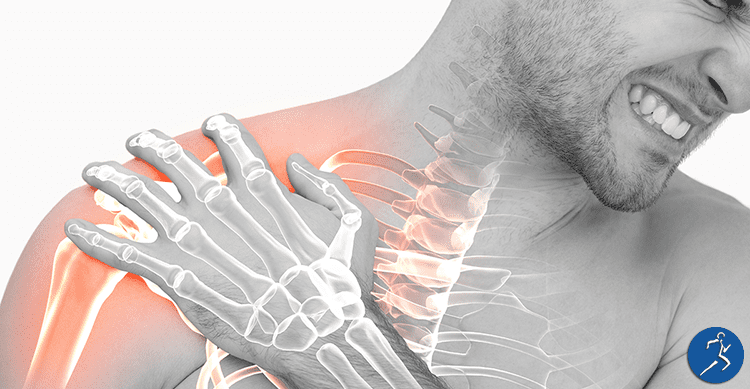Expert Rotator Cuff Injury & Shoulder Pain Treatment in Vadodara
Regain pain-free shoulder movement and strength. Comprehensive non-surgical care for rotator cuff tears, tendonitis, and shoulder injuries.

Understanding Rotator Cuff Injuries & Shoulder Pain
The rotator cuff is a group of muscles and tendons that surround the shoulder joint, providing stability and enabling a wide range of motion
What is the Rotator Cuff?
The rotator cuff consists of four muscles (supraspinatus, infraspinatus, teres minor, and subscapularis) that work together to stabilize the shoulder joint and facilitate arm movements. Injuries to these structures are common and can significantly impact daily function.
- Rotator Cuff Tears - Partial or complete tears in the tendons, often from acute injury or chronic degeneration
- Tendonitis - Inflammation of the rotator cuff tendons, commonly from overuse or repetitive overhead activities
- Impingement Syndrome - Compression of rotator cuff tendons between the humeral head and acromion bone
- Bursitis - Inflammation of the bursa sac that cushions the rotator cuff tendons
- Strain/Sprain - Overstretching or tearing of muscle fibers or ligaments supporting the shoulder
- Degenerative Changes - Age-related wear and tear that weakens tendons and increases injury risk
Early intervention with proper chiropractic care can prevent minor shoulder issues from developing into chronic conditions requiring surgery.

Recognizing Rotator Cuff Injury Symptoms
Early identification of shoulder problems leads to better outcomes and faster recovery
Night Pain
Pain that worsens at night, especially when lying on the affected shoulder, disrupting sleep patterns.
Limited Range of Motion
Difficulty reaching behind back, overhead, or across body. Feeling of stiffness and restricted movement.
Weakness & Instability
Difficulty lifting objects, feeling of shoulder "giving way," or inability to perform routine activities.
Pain with Specific Movements
Sharp pain with overhead activities, throwing motions, or reaching. Pain may radiate down the arm.
Our Rotator Cuff Injury Treatment Approach
Comprehensive, phase-specific rehabilitation to restore shoulder function and prevent recurrence
Comprehensive Shoulder Assessment

Range of Motion Analysis
Detailed assessment of active and passive shoulder movements to identify specific movement restrictions and pain patterns.

Muscle Strength Testing
Specific testing of each rotator cuff muscle to identify weaknesses, tears, or functional deficits.

Special Orthopedic Tests
Specific maneuvers like Neer's, Hawkins-Kennedy, and empty can tests to diagnose impingement and rotator cuff pathology.
Our Targeted Treatment Methods

Joint Mobilization
Gentle, specific movements to restore normal glenohumeral joint arthrokinematics and reduce pain.

Soft Tissue Release
Targeted myofascial release and massage to address muscle tension, trigger points, and scar tissue adhesion.

Trigger Point Therapy
Dry needling and manual techniques to release hyperirritable spots in shoulder and scapular muscles.

Progressive Rehabilitation
Phase-specific exercises starting with pain-free range, progressing to strengthening and functional training.

Scapular Stabilization
Exercises to strengthen scapular muscles for proper shoulder mechanics and rotator cuff support.

Functional Training
Sport-specific or activity-specific exercises to safely return to desired activities and prevent re-injury.
Patient Success Story
Real results from our rotator cuff injury treatment
"After a fall, I developed severe shoulder pain that made even simple tasks like putting on a shirt or reaching for dishes excruciating. My doctor diagnosed a rotator cuff tear and suggested surgery. I decided to try conservative treatment first at Spine-X. Dr. Zinzala's comprehensive approach of gentle mobilizations, targeted exercises, and soft tissue work has been remarkable. Within 8 weeks, my pain reduced by 80% and I regained most of my shoulder mobility. I can now sleep through the night and perform my daily activities without pain. The progressive strengthening program has given me confidence in my shoulder's stability."
- Patient from Vadodara (Rotator Cuff Injury Treatment Success)
Preventing Rotator Cuff Injuries
Proactive strategies to maintain shoulder health and prevent future problems
Balanced Strength Training
Strengthen both rotator cuff and scapular stabilizer muscles to maintain proper shoulder mechanics and prevent imbalances.
Proper Lifting Technique
Use legs instead of arms for heavy lifting, keep objects close to body, and avoid overhead lifting when tired.
Gradual Activity Progression
Avoid sudden increases in exercise intensity or duration. Build up gradually to allow tissues to adapt.
Posture Awareness
Maintain good posture during daily activities to prevent forward shoulder positioning that contributes to impingement.
Ice After Activity
Apply ice to shoulder after strenuous activity or at first sign of pain to reduce inflammation and prevent escalation.
Regular Maintenance
Continue shoulder exercises and stretches even after symptoms resolve to maintain strength and flexibility.
Ready to Restore Your Shoulder Function?
Start your journey to pain-free shoulder movement with our specialized rotator cuff treatment
85% Avoid Surgery with Conservative Care
Most rotator cuff injuries respond well to comprehensive conservative treatment, avoiding the need for surgical intervention